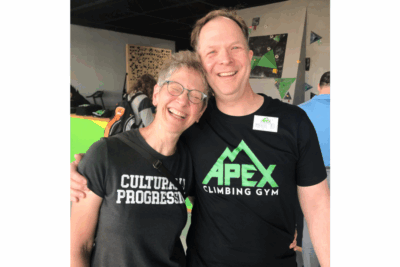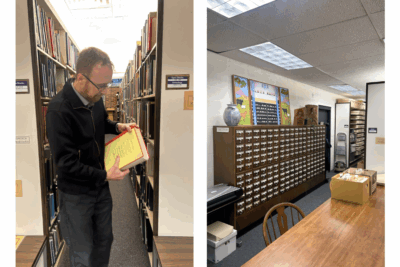Together they stand in black, one by one taking the stage to recite a story written by another.
This sets the scene for the annual Goshen Monologues, a night where women and non-binary people perform a selection of stories, monologues and poems created anonymously by other non-male identifying people of the Goshen College community.
The Goshen Monologues, born out of a desire to create an event similar to Eve Ensler’s 1996 play The Vagina Monologues, first took place in 2013. Because the event has grown in popularity over the years, the number of participants has grown to around 30 performers, proof that people appreciate its passionate, evocative recitations. Goshen Monologues has been praised for creating a sense of unity and support between its participants and spectators by the time its lights come up.
“Monologues, more than anything, is intended to make people more aware of the experiences people have on campus,” said Hannah Friesen, a senior. “They’re intended to challenge audience members to see how the way they live their life affects others, to bring up important issues and to celebrate the human spirit of the writers, actors and audience members.”
While the monologues can cover any topic that moves the author to write, some of the usual categories include relationships, body image, sexual violence, friendship and identity. Some stories move the audience to tears, others to laughter. All are an intimate look into the inner monologues of people within our campus community.
“A lot of the stories we share are not the stories we share in public spaces,” said Stephanie Dilbone, a junior biochemistry major and member of the 2019 monologues committee. “They are valuable both to the people telling and hearing them.”
In an effort to make this year’s experience more valuable for all involved, there have been slight changes to both the location and planning of the sixth-annual Goshen Monologues.
The most noticeable difference is in the locale of the performance, held this year in the John S. Umble Center, rather than the usual Church-Chapel space. While the Umble Center offers less audience seating than the church, Dilbone felt that the change would incite a shift towards a more performance-receptive audience attitude. Being in a space that typically features performance art could create more of the contemplative atmosphere that the monologues committee, lead by professors Jessica Baldanzi and Anna Kurtz Kuk, seeks to create, besides it being slightly more versatile.
Other changes include a Mar. 31 performance date, later than previous years, as well as an increased advertising effort for the open casting call. Posters and announcements can be seen strewn across the campus’s many billboards, sending out the call for female and non-binary actors to bring the selected monologues to life. However, potential performers should have no fear if acting is not in their arsenal; the only quality needed is the ability to memorize, no theater experience required.
This year’s casting call will be Sunday, Jan. 27, in Newcomer 17. Interested volunteers can choose to attend either the casting session at 1:00 p.m. or 2:30 p.m.. Attendees can expect to be asked to read selections from the monologues, both alone and with others. Additionally, because people auditioning may be waiting until their turn to audition, the committee recommends bringing homework or another activity to pass the time.
“By taking on the story of someone else, someone you don’t know, you are allowing yourself to embody what they were thinking and feeling in the moment they wrote the piece,” said Friesen. “When the performers are different than the people who wrote the pieces, it helps the audience to be able to look at that monologue as something that doesn’t just affect that one person, but rather something that could be experienced by anyone they interact with every day,” she said.
For those more interested in watching than speaking, filling an Umble Center seat as an audience member is just as important to the impact of the Goshen Monologues.
“No performance is complete without an audience,” said Dilbone. “Come with a receptive mind and be willing to listen, these stories were meant to be shared.”
The 2019 performance of the Goshen Monologues will be at 7:30 pm on Mar. 31. Admission is free and includes the option of convocation credit for Goshen College students.


